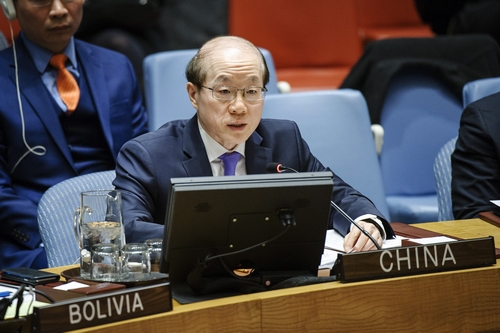| Statement by Ambassador LIU Jieyi at the Security Council Debate on Trafficking in Persons in Conflict Situations |
| 2017-03-15 09:16 |
|
China welcomes the initiative of the United Kingdom to convene today’s ministerial-level open debate. I should like also to thank Secretary-General Guterres and Executive Director Fedotov for their briefings. China also listened attentively to the briefings by Commissioner Hyland and Ms. Elman. Today some parts of the world are ravaged by incessant armed conflict and the rampant abuses of armed groups, terrorist organizations and transnational organized criminal groups, which pose a grave threat to the safety, security, health and dignity of local populations. One of the dire consequences is the growing scourge of human trafficking in conflict situations. Victims are often subject to forced labor and slavery and vulnerable groups, in particular women and children, bear the brunt. China strongly rejects all forms of trafficking in persons in armed conflict and supports international efforts to tackle this scourge in a concerted manner. First, we must step up efforts to combat trafficking in persons and slavery in conflict situations, as perpetrators — armed groups, terrorist organizations and transnational organized criminal networks — are highly mobile and can move across borders. This issue concerns countries of origin, transit and destination. On one hand, the international community should vigorously support the countries concerned in combating criminal activities and provide them with targeted capacity-building support in the areas of law enforcement, border control and financial regulation, in line with their own national conditions and upon their request. On the other hand, we need to enhance international cooperation with a focus on law enforcement collaboration and leverage the role of regional and subregional organizations and pool all resources available to investigate, disrupt and dismantle trafficking networks. We need to encourage the United Nations Office on Drugs and Crime, UNWomen, the International Organization for Migration and other relevant United Nations agencies and international organizations to provide conflict-affected countries with financial, human and technical support, in line with their respective mandates and expertise. Secondly, we need to attach greater importance to combating terrorism. Terrorist organizations, such as the Islamic State in Iraq and the Levant, obtain funding by means such as trafficking in persons, forced labor and slavery and resort to brutal tactics. The international community should uphold uniform counter-terrorism standards; take coordinated and concerted action; exercise zero tolerance against terrorism and resolutely address crimes of trafficking, exploitation and enslavement of populations in conflict situations, in particular women and children; take an integrated approach that encompasses political and economic means and stop the financial flow of funds obtained from trafficking in persons and slavery to terrorist organizations; and dismantle their criminal networks. We need to take robust and effective measures to combat the use by terrorist groups of the Internet to disseminate terrorist audio and visual products in order to incite individuals to commit acts of terrorism and for recruitment purposes. We must protect people in conflict areas from becoming easy prey to terrorist and extremist ideologies and falling victim to such crimes as human trafficking. In the meantime, we need to ensure that victims and survivors of such crimes receive the assistance they need to facilitate their reintegration. Thirdly, we must reinforce efforts towards a political settlement of conflicts. Protracted regional conflicts provide a breeding ground for trafficking in persons and other criminal activities. The international community should work harder to find political solutions to hotspot issues with a renewed sense of urgency, assist countries in conflict in advancing their political process and their national reconciliation in line with the purposes and principles of the Charter of the United Nations and in settling their disputes and bridging their differences by peaceful means, including through dialogue and consultation. We need to give greater weight to the prevention of conflicts and help countries to improve their ability to achieve sustainable development, consolidate a basis for peace and root out the conditions and drivers for trafficking in persons and slavery in conflict situations, so as to provide an enabling external environment for the protection of women and children in conflict situations. China will continue to support the international community in exercising a zero-tolerance policy against trafficking in persons in armed conflict and enhancing the protection of the rights of women and children in armed conflict. China will work with its partners to safeguard peace, security, stability and development at the international and regional levels. (UN Photo/Manuel Elias) |
| |||||||||||||
| |||||||||||||
